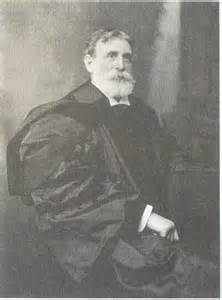What’s a Presbyterian to do? Especially at the staunchly conservative Princeton Seminary at the end of the nineteenth century, Presbyterian intellectuals wrestled with the questions posed by their creationist theology. One problem remained particularly stubborn and particularly relevant to Mother’s Day.
B.B. Warfield was no liberal. He was largely responsible for the “Princeton Theology” that bequeathed to American fundamentalism a vital notion. Along with his colleague A.A. Hodge, Warfield argued that we must read the Bible as inerrant in its original autographs. That is, later translators may have messed things up here and there, and we may certainly err in our understanding of the Bible, but real orthodoxy requires us to believe that the inspired writers of the Bible did not make mistakes.
Among the many gems in Bradley Gundlach’s book about Princeton and the “evolution question,” we find Warfield’s notes about Eve and evolution.
In the late 1800s, Warfield and the other lions of orthodoxy at Princeton wondered what evolutionary ideas meant for orthodox belief. Could an evolutionary theory fit in with a universe that had been planned for eternity by an all-knowing God? If evolution could be separated from its materialistic assumptions, could it be used as a way to understand God’s plan for humanity?
As Professor Gundlach argues, time and again Princeton’s conservative thinkers said yes. They objected to the assumptions that some people wrongly associated with evolution—that it was random, directionless, and atheistic, for instance. But they embraced the notion that God had developed all life from earlier forms. Just as a tree rests within the potentiality of a seed, so all life may have developed from simpler forms, the Princetonians insisted.
In short, most Old Princetonians embraced what has been called “theistic evolution,” a notion similar to what some folks today call “evolutionary creationism.”
There was one tough sticking point, however. As Professor Gundlach describes, in Warfield’s lectures on anthropology from the late 1800s, he struggled with the theological implications of evolution. Warfield asked himself and his students if a God-guided evolution was
consistent with the Biblical account of the origin of things in general & of man in particular.
According to Gundlach, Warfield answered with a qualified yes. The only problem Warfield saw was at the root of Mother’s Day. As Warfield explained in his anthropology class,
I am free to say, for myself, that I do not think that there is any general statement in the Bible or any part of the account of creation, either as given in Gen I & II or elsewhere alluded to, that need be opposed to evolution. The sole passage which appears to bar the way is the very detailed account of the creation of Eve.
The rest of the Genesis account of creation, Warfield believed, could be read without doing violence to its original meaning as a poetic description of evolution. But Eve was different. The Mother of Humanity was made by a special divine act, in language starkly different from that of the rest of Genesis.
For Warfield, at least, evolution need pose no problem for Christians. Only the question of Eve needed to be resolved.






Dan Knauss
/ May 11, 2015Fascinating history! Now what I would like to know is when this sort of literal reading of things like the creation of Eve came to be considered as meaningful and true only as a literal, empirical account of what had actually happened at some point. This is not the only option, and before a certain point in the 17th century it would not have been thinkable at all as empiricism had not yet been invented.
Clearly Warfield is noticing that God performing a miraculous operation on Adam is nothing like the evolution of a species, the slow work of glaciers and stars, and so on. But something prevents him from setting the text in a premodern epistemic frame where truth is not tied to that kind of fact.